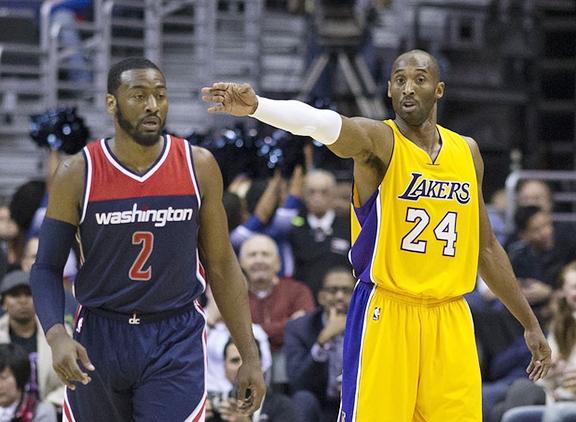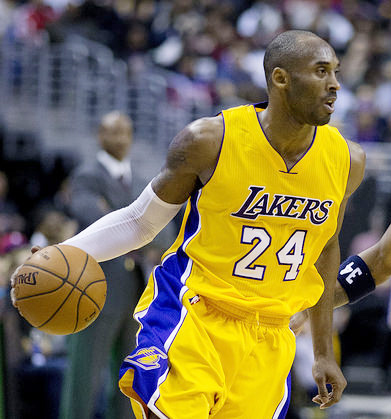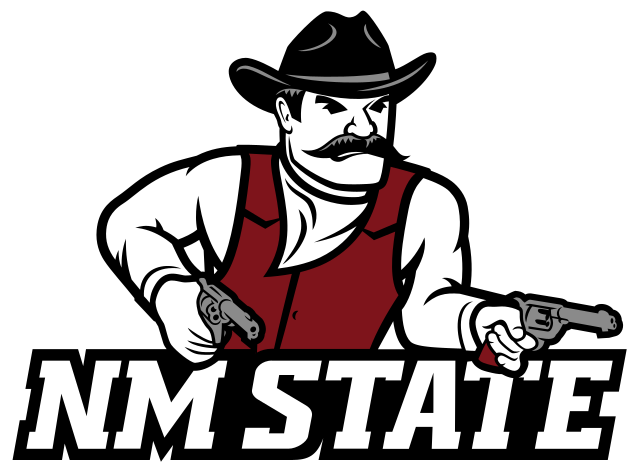Kobe Bryant discusses the value of sports, coaches

Here are some of Bryant best comments.
On growing up playing soccer …
It trains the brain to look at things in sets of threes. … In basketball, what you see is the game being played with one or two players. There’s pick-and-roll, give-and-go.In soccer, you’re playing in threes all the time, playing in triangles all the time. It’s not just my communication with you, but it’s how this communication and ball movement between us opens up something for that person. It’s not good enough for me to just think of you.
When I played basketball, it helped me at an early age to see the game three moves ahead instead of just two.
On the coaches who taught him the game at an early age …
They didn’t give me anything that wasn’t absolutely necessary to have. It wasn’t like they put me in front of a cone and forced me to dribble with a basketball, and then five tennis balls, and then do all this spinning and stuff. It’s unnecessary.
They taught me how to think the game first. How to pass left hand, right hand. How to finish left hand, right hand. And how to shoot the ball properly. Teach you how to play with others.
On basketball as work versus play …
It feels like you don’t work a day in your life when you’re doing what it is that you love to do. To me, play and hard work are one and the same. I didn’t realize basketball was hard work until it became a job and I started looking around at these other players and they weren’t playing as often as I was. And I started to realize, there’s a difference for some in work versus play. But for me, they’re one and the same.
On his high school coach, Gregg Downer …
He said, “If you want to get to that level, you have to stay at practice late. You want to get here early? I’ll go an open up the gym for you early.”
» SEE: The Aspen Institute study shows decline in youth sports participation
He was always on me about teaching the game. In high school, I could dominate because I was taller. He said, “No no, you got to get a mid-range game. It’s not good enough just to shoot 3 and post kids up, you gotta be able to get here, stop and pop. Pull up for the jumper, runners, all that good stuff.” He’s just a phenomenal coach.

On all of his coaches (soccer/basketball; Europe/America) …
They were never condescending. They were never abusive with how they taught the game. (My coaches) spoke to tactics, and if you had a question they encouraged it. They wanted you thinking more. It wasn’t a coach who said, “Look, I’m going to do all the thinking for you. Go out here, do this, do that” … I never had coaches like that. It was more like, “Here’s the idea, now what are you reading from that?”
They would always say our job is to give you the fundamentals, and from those fundamentals you can then have the ability to go out and problem solve.
On the value of imagination …
Imagination is key. You have to be able to envision it and dream it first. When I was a kid growing up, I’d be out playing by myself or when I was in the house with my dad’s tube socks, I would envision that I was inside the Forum. I would really be going against the Celtics. That’s what I see. To have the imagination and put yourself here … it’s really important to try and hold on to.
In this day and age, sports has become very structured, which is also concerning. It’s practice time, club teams, so we don’t have time to bring that imagination out.
On problem solving with young athletes …
If we’re constantly providing the answers for them, they’re not going to figure out how to problem solve on their own. So our job is to simply give them the tools to fish, and let them go out there and fish.
On coaching kids …
It’s a constant learning experience. We can’t discount the importance of coaches. If you ask Phil Jackson how do you get better as a coach, he’ll give you a very specific answer: What he reads, what he studies, psychology, human development … he studies up on how to connect with (players).
The level of importance that we have as coaches and parents cannot be understated. And to have a platform to be curious ourselves is extremely important.












